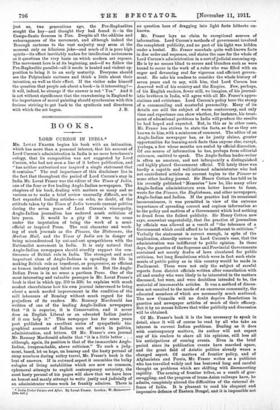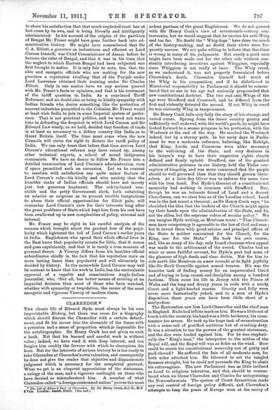BOOKS.
LORD CURZON IN INDIA.*
Mx. LOVAT FRASER begins his book with an intimation, which has more than a personal interest, that his account of Lord Curzon's administration in India is no mere henchman's eulogy, that its composition was not suggested by Lord Curzon, who had not seen a line of it before publication, and " has neither authorized nor inspired a single statement that it contains." The real importance of this disclaimer lies in the fact that throughout the period of Lord Curzon's stay in India Mr. Lovat Fraser was the editor of the Times of India, one of the four or five leading Anglo-Indian newspapers. The chapters of his book, dealing with matters so many and so various as to make a brief review unusually difficult, are in fact expanded leading articles—an echo, no doubt, of the attitude taken by the Times of India towards current politics
dining the seven years of Lord Curzon's viceroyalty. Anglo-Indian journalism has endured much criticism of late years. It would be a pity if it were to come under the imputation of being the work of a semi- official or inspired Press. The real character and work-
ing of such journals as the Pioneer, the Statesman, the _Madras Mail, and the Tinter of India are in danger of being misunderstood by out-and-out sympathisers with the
Nationalist movement in India. It is only natural that Anglo-Indian newspapers should sturdily support the con- tinuance of British rule in India. The strongest and most important class of Anglo-Indians is spending its life in making British rule as beneficent, as progressive, as efficient as human industry and talent can make it. But the Anglo- Indian Press is in no sense a partisan Press. One of the most interesting and valuable passages in Mr. Lovat Fraser's book is that in which (pp. 330 to 338) be explains with much modest cheerfulness how his own journal intervened to bring about a much needed improvement in the condition of the mill labourers of Bombay without much regard for the prejudices of its readers. Mr. Ramsay Macdonald has written of one of the leading Anglo-Indian newspapers that "it is superior, it is Conservative, and it never does an English Liberal or an educated Indian justice if it can help it." This newspaper has for some years past published an excellent series of sympathetic bio- graphical accounts of Indian men of mark in politics, administration, and letters. Of Mr. Fraser's own journal Mr. Ramsay Macdonald admits that "it is a little better . . .
although, again, its position is that of the immaculate Anglo- Indian, irreproachable, above criticism." To such a judg- ment, based, let us hope, on hearsay and the hasty perusal of stray numbers during sultry travel, Mr. Fraser's book is the best of answers. If in outward aspect it resembles the bulky eulogies of living notabilities which are now so common, ephemeral attempts to exploit contemporary notoriety, the most hasty perusal of his pages will show that we have here an honest and manly attempt to write justly and judicially of an administrator whose work he frankly admires. There is • India Under Curzon and After. By Lovat Frazer. London: W. Heinen...- 11es. net.] no question here of dragging into light facts hitherto un- known.
Mr. Fraser lays no claim to exceptional sources of information. Lord Curzon's methods of government involved the completest publicity, and no part of his light was hidden under a bushel. Mr. Fraser marshals quite well-known facts in due order and sequence, and states the case for the whole of Lord Curzon's administration in a sort of judicial summing-up. He is by no means blind to errors and blunders such as were bound to occur in the work of a ruler who was filled with an eager and devouring zeal for vigorous and efficient govern- ment. He asks his readers to consider the whole history of seven years and to say, wits him, that Lord Curzon has deserved well of his country and the Empire. Few, perhaps, of his English readers, fewer still, we imagine, of his journal- istic brethren in India, will agree with all Mr. Fraser's appre- ciations and criticisms. Lord Curzon's policy bore the stamp of a commanding and masterful personality. Many of its details are still the subject of warm controversy, and only time and experience can show whether, for instance, his treat- ment of educational problems in India will produce the results he had hoped and expected. But, in this as in other cases, Mr. Fraser has striven to state the facts, so far as they are known to him,with a minimum of comment. The editor of an Anglo-Indian newspaper has, as be justly claims, greater opportunities for learning such facts than anyone else, except, perhaps, a few whose mouths are sealed by official discretion. Of one source of information he has, perhaps from editorial reticence, omitted to speak. The Anglo-Indian leader-writer is often an amateur, and not infrequently a distinguished. , and highly placed Government official. Till lately there was hardly a capable and well-informed administrator who had not contributed articles on current topics to the Pioneer or some other leading journal. Sir Henry Cotton has told us in his recently published "Memories" bow he, like many other Anglo-Indian administrators even better known to fame, wrote for the Pioneer, the Englishman, and other newspapers, Anglo-Indian and Indian. If the practice had its occasional inconveniences, it was permitted in view of the extreme importance of spreading correct and copious information as to the policy and motives of a Government which had nothing to dread from the fullest publicity. Sir Henry Cotton now says, somewhat ungratefully, that the practice of journalism by officials was allowed as a result of " the tolerance of a Government which could afford to be indifferent to criticism." Verbally the statement is correct enough, in spite of the implication, absurdly untrue in Lord Curzon's case, that the administration was indifferent to public opinion. In those days, the gazettes of the Supreme and Provincial Governments contained not merely drafts of laws circulated for public criticism, but long Resolutions which were in fact such state ments of public policy as in this country would be made in Parliament. These were not only the subject of careful reports from district officials written after consultation with all and sundry who were likely to be interested in the matters discussed, but were, and were doubtless intended to be, the material of innumerable articles. It was a method of discus- sion not unsuited to the needs of an enormous community, the educated members of which are necessarily much scattered. The new Councils will no doubt deprive Resolutions in gazettes and newspaper articles of much of their efficacy. But it by no means follows that wider publicity and discussion will be obtained.
Of Mr. Fraser's book it is the less necessary to speak in detail, since it will of course be read by all who take an interest in current Indian problems. Dealing as it does with contemporary matters, its author will not expect any of his readers to share all his opinions, still less all his anticipations of coming events. Even in the brief period since its publication events have marched apace, and the great field of Asiatic politics already wears a changed aspect. Of matters of frontier policy, and of Afghanistan and Persia, Mr. Fraser writes as a publicist who has travelled widely and has bestowed long and careful thought on problems which are shifting with disconcerting rapidity. The arming of frontier tribes, as a result of gun- smuggling, and the progress of trans-Asian railways have he admits, completely altered the difficulties of the external de- fence of India. It is pleasant to read his eloquent and impressive defence of Eastern Bengal, and it is impossible not
to share his satisfaction that that much neglected tract has at last come by its own, and is being liberally and intelligently administered. In his account of the origins of the partition of Bengal Mr. Fraser might have gone further back into ad- ministrative history. He might have remembered that Sir C. A. Elliott, a governor as industrious and efficient as Lord Curzon himself, was Chief Commissioner of Assam before he became the ruler of Bengal, and that it was in his time that the neglect to which Eastern Bengal had been subjected was first brought to notice. It is only fair to note, too, that the able and energetic officials who are making for the new province a reputation rivalling that of the Punjab under Lord Lawrence obtained their training under Sir Charles Elliott. Only in one matter have we any serious quarrel with Mr. Fraser's facts or opinions, and that is his treatment of the tariff question in India. As a convinced Tariff Reformer, and no doubt also as being in kindly sympathy with Indian friends who desire something like the protection of nascent industries permitted to the Colonies, Mr. Fraser would at least wish India to join in some Imperial system of prefer- ence. That is not practical politics, and we need not waste time in defending the despatch in which Lord Curzon and Sir Edward Law wisely, as we hold, decided that freedom of trade is at least as necessary to a debtor country like India as to Great Britain itself. The time must come when the new Councils will claim the right to dictate the tariff policy of India. We can only trust that before that time arrives Lord Curzon's educational reforms may have raised up, among other technical experts, a school of sound indigenous economists. We have no desire to follow Mr. Fraser into a detailed examination of Lord Curzon's administration, even if space permitted such an excursion. Let us be content to mention with satisfaction one quite minor feature of Lord Curzon's rule—his kindly and wise anxiety that the humbler ranks of Indian officials should have not merely just but generous treatment. The red-turbaned con- stable and the petty Government clerk, both subsisting on salaries so exiguous as to present terrible temptations to abuse their official opportunities for illicit gain, will remember Lord Curzon's care for their interests long after the great problems of State which kept him from his rest have been swallowed up in new complexities of policy, external and internal.
Mr. Fraser may be right in his careful analysis of the reasons which brought about the gradual loss of the popu- larity which lightened the toil of Lord Curzon's earlier years in India. Englishmen who spend their whole official lives in the East know that popularity counts for little, that it comes and goes capriciously, and that it is rarely a true measure of personal desert. A Viceroy differs from his humbler official subordinates chiefly in the fact that his reputation rests on more lasting bases than popularity and will ultimately be decided by history. In the meanwhile Lord Curzon may well be content to know that his work in India has the enthusiastic approval of a capable and conscientious Anglo-Indian journalist, who, "fter all, has better means of arriving at an impartial decision than most of those who have watched, whether with sympathy or trepidation, the career of the most energetic and vigorous Viceroy of modern times.



















































 Previous page
Previous page